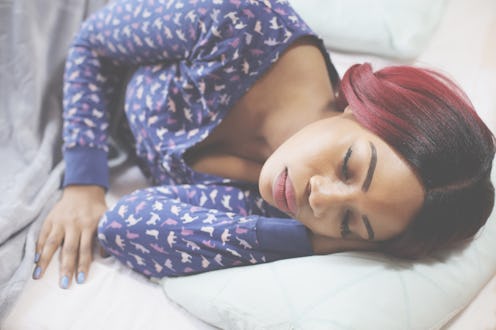
That's no denying that sleeping with white noise in the background can be helpful in a lot of ways. A fan or white noise machine can drown out noisy roommates, honking cars, and a snoring partner. But the reality is, drifting off to this static-y sound isn't necessarily as benign as it may seem.
For starters, "consistently falling asleep to the sound of a white noise machine will create a sleep association," Dr. Sujay Kansagra, a sleep expert with Mattress Firm, tells Bustle. "That means over time your brain will associate the process of going to sleep with having the white noise machine on. This makes it more difficult to fall asleep without the sound of one, and leads people to believe they need to hear that sound to sleep."
While it isn't the end of the world, it can be incredibly frustrating to lie awake all night simply because it's too quiet. But that isn't the only potential downside of listening to white noise while you sleep.
"Research on the effect of white noise on the brain is minimal and conflicting, but some studies show that ongoing ambient noise can cause the brain to react the same way it would to stress," Rose MacDowell, a sleep expert and chief research officer at Sleepopolis, tells Bustle. "This can result in release of the 'stress hormone' cortisol, and decreased levels of dopamine in parts of the brain that control learning and memory.”
Of course, it's important to keep in mind what white noise actually is. "Some people think white noise is the sound of ocean waves, a fireplace crackling, or a water fall. Some also think of white noise as television static," Dr. Catherine Jackson, a licensed psychologist and board-certified neurotherapist, tells Bustle. "However, while television static is similar to white noise, these are simply soothing sounds or background noise. White noise on the other hand is a combination of many different frequencies of sound people are capable of hearing, ranging from 20 to 20,000 Hz, all occurring at once."
This sound can come from an actual white noise machine, an app on your phone, or one of the countless white noise videos on YouTube, any of which you might use to fall asleep. And it's this type of noise that may lead to a ringing in your ears, over time.
"Some side effects or things that can be a negative of white noise include an impact on brain cells that causes ringing in the ears (tinnitus) from having heard the sound constantly and/or too loudly," Jackson says. So while white noise machines are considered safe to use, she says, more research needs to be done in this area in order to get a thorough understanding of any other negative effects of white noise on the brain and sleep.
In the meantime, or if you're worried about things like stress or tinnitus, there are plenty of other ways to fall asleep without potentially putting yourself at risk. Perhaps most helpful of all is creating a routine and sticking to a regular bedtime, which "can help promote sleep and allow your brain and body to get used to getting into sleep mode at a certain time," Jackson says.
If you start to get ready for bed at the same time each night (even on the weekends, when you can) you'll train yourself to feel sleepy, and have an easier time drifting off as a result. You can also play soothing music at night, Jackson says, as long as it isn't too loud or blasting in through headphones, since that can have a negative effect on your ears.
As for some noise-free ways to get to sleep, consider "using ear plugs (silicone can create a tighter seal), blocking sound with heavy drapes or other sound-proofing materials, or using noise-canceling headphones," MacDowell says.
You can also attempt to remedy whatever annoying noises have been jolting you awake. For example, "if a partner’s snoring or movements keep you awake," MacDowell says, "try sleeping separately or asking them to see a sleep specialist for diagnosis and treatment."
If you enjoy sleeping with white noise, you can certainly keep doing it. But if you're concerned about the impact it may have, try a few of these others options, and you should still be able to get a good night's sleep.
Studies referenced:
Spreng, M. (2000). Possible Health Effects Of Noise Induced Cortisol Release. Noise Health. 2(7):59-64.
Attarha, M., Bigelow, J., & Merzenich, M. M. (2018). Unintended Consequences of White Noise Therapy for Tinnitus—Otolaryngologys Cobra Effect. JAMA Otolaryngology–Head & Neck Surgery, 144(10), 938. doi: 10.1001/jamaoto.2018.1856
Experts:
Dr. Sujay Kansagra, sleep expert with Mattress Firm
Rose MacDowell, sleep expert and chief research officer at Sleepopolis
Dr. Catherine Jackson, licensed psychologist and board-certified neurotherapist